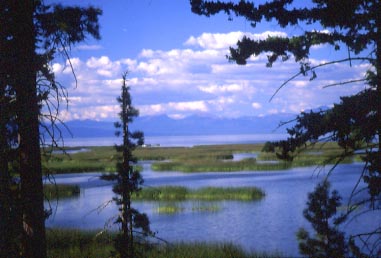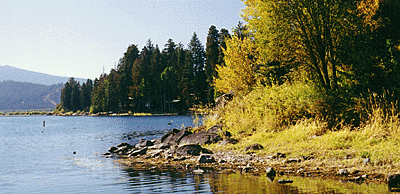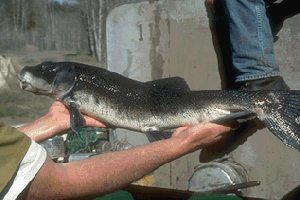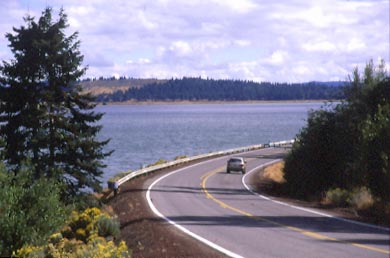Copyright 2002, by Mark Edward Vande Pol All rights reserved

The standoff over irrigation water in Klamath Falls, Oregon has become a symbol of land use in the American West and its battle with a largely urban environmental movement. What was once a group of dedicated volunteers, is now a becoming a brutal phalanx of corporate foundations, government agencies, grandstanding lawyers, and global power interests, all manipulating private resource value for ulterior purposes. Its original goal of environmental health has been lost in the aggressive pursuit of raw power.
Klamath Basin is a symbol of what is wrong with entrusting an armed monopolist with the power to manage the environment. Honest citizens have been beaten into a defensive response, invoking their rights when they rightly perceive survival interests at stake. We all hear it: "Suckerfish versus people," "Trash fish," "They taste lousy," "We used those as fertilizer," "They eat salmon eggs," and "Farms and food or the environment." The saddest part about it is that this issue may not be a matter of "versus" or "or."

Federal action to protect suckerfish has been to retain water in the lake and keep the level as high as possible in a drought year. It's an easy sale to make to an ignorant public. Farmers and fish are competing for water in an "unfair" fight because people can get their food "elsewhere." The urban public "needs" suckerfish to protect recreational water quality. To level the playing field and "make room" for suckerfish, cut off the water to the farmers which certainly pleases investors "elsewhere." That's what they call a "win/win" proposition. Unfortunately for that rationale, suckerfish apparently prefer, shallow water in what would have been a drying swamp but for construction of the lake. Bureau of Reclamation records reportedly document high water levels corresponding with suckerfish kills in 1995, 1996, and 1997 and no kills corresponding with lower levels in 1992 and 1994. In only 3 years, since 1991, has the lake elevation been higher than it is now. There was no peer review of the recommendations in the initial study listing the fish, because the action was taken under an "emergency" and nobody knows what is a sufficient amount of water to maintain a functional suckerfish colony. Water quality may turn out to be more important than quantity. Subsequent scientific evaluation of the study has indicated that the study was deeply flawed. Agency action has been to deny review or just compensation to the OWNERS of the water. They have taken possession of private property by force of arms.

Why would they do that? All indications are that the purpose of the selected action is to take the land for as little as possible. It fits the pattern.
This article is not about the legal, historical, and technical background in Klamath Basin. There are experts on those topics more qualified than most biologists; people who live there and work the land. Farmers have studied it, fished it, and loved it for generations. This discussion is about the ethical and structural mechanics by which such takings occur; why the problem in Klamath Basin is your problem.
When government gains the power to control the use of private property, it becomes possible for the politically dominant to profit by high commodity prices using government regulation to constrain supply. One merely drives competitors out of business by manipulating the perception of risk to a land use preferred by a democratic majority.

As democratic claims against the use of property proliferate, legislatures and courts are overwhelmed with cases that are technical and difficult to prove. Neither have the power to enforce a judgement. The demand for expediency seduces them into defaulting upon their constitutional responsibilities to the only remaining branch with relevant expertise and police power: the executive branch of government. Administrative agencies can then acquire power by effecting public claims on the use of private property. That process proceeds unchecked as agencies gain sufficient power to ignore the preferences of the democratic majority and instead use the asset to express their own interests. Ironically, the precedents used to control public property against their preferences, are often the same as were used to extend majority claims against private property. Look around you. Look at how agencies are attributing environmental harm to "recreational overuse" of parks and open space. It is coming.
Legal precedents sufficient to take control of individual property are sufficient to take control of ALL property. To socialize private property is a monstrous evil because control of the resource falls under an agent with no structural motive to prevent or eliminate ecological problems. Quite the contrary, civic management of the environment not only doesn't work, it has every reason not to work. As eco-logical problems worsen and resulting economic crises deepen, the power acceded to government agencies expands while destroying the ability to finance solutions! The agency instead serves the limited interests of the politically dominant, who use the power of government to gain de facto control of ALL factors of production.
History teaches that this is not a good thing. That is why this case is your case.

Private "charitable" foundations of major corporations have effected this strategy across the nation, both in Congress and in the courts. They sponsor and publicize subjective "science," whether to obtain legislation directed to an obvious problem or toward legal action against a weakened target. Legal precedent extends the applicability of cited legislation and lowers the cost successive claims. Property owners gradually lose their ability to finance the cost of compliance or legal resistance. Lacking a profitable use of the property, the market value approaches zero. After repeated exercise of expensive regulations, pur-chase of the land then concludes any remaining claim by an owner.
The historic successes of the environmental movement are the source of the mandate the system still enjoys. Much pollution has been cleaned up and recreational opportunities have enlarged. Unknown to many, there are failings too. Many of these problems have yet to manifest and are rarely publicized. Some are serious.

When government does make a mistake, it does so on a grand scale. We owe the propagation of kudzu (27 million acres), star thistle (30 million acres), and numerous other weeds directly to government erosion control programs. Where erosion control programs succeeded on land, they often failed along coastlines. No one ever seemed to ask where and how it is best for erosion to occur. The County of Santa Cruz, California banned roadside weed spraying in the name of protecting water quality. When the County started mowing instead of spraying (at $5,000 per mile), they spread weed seeds along hundreds of miles of roads. Some (such as French Broom) fill our forests with fuels that threaten their very existence given government fire suppression. These species will dominate the forest after the next fire. Other weeds have effects that are more insidious. We now have thousands of tons of poisonous hemlock in our watersheds, thanks to activist efforts to protect water quality, with no one to hold accountable. Consider the similar effects mandating MTBE in our gasoline has had in groundwater.
What possessed us to conclude that we needed government to manage competing environmental risks? We know that it can't run an economy, why would we think it could run an ecology? Civic environmental management doesn't work. It is a structurally incompetent system. It is subject to corruption. It threatens our rights, our health, and our freedom. So why do we keep doing it?

We keep doing it because we covet the use of other people's property without just compensation. We assume an entitlement for products that we demand for free and complain that any civic compensation for these services constitutes a subsidy. Open space, species management, wetlands, weed and pest control, scenic value, erosion control, and water quality monitoring. We assume that these goods should be supplied by somebody we assume to be a perpetrator. We pay police to harass farmers into doing our bidding and resist paying them for those seemingly intangible products. When the farmers go broke, we buy the food from overseas, not recognizing that there are few guarantees of environmental protection elsewhere and few controls on incoming pests. We are now a nation that is dependent upon imported food, and our security and sovereignty as a nation is at risk of extortion for the benefit of unaccountable interests.
In the process, we destroy the value of the property for the very uses we desire. The agent we empower gains the power to enslave thereby. The taker thus gets taken.
How could we be so dumb?
Everyone understands that, without some form of oversight or means of expressing their interest in healthy ecosystems, the environment will deteriorate. Nobody wants to go back to the days when sewage treatment consisted of a pipe over the river. Activists are more than happy to sell the public exaggerated horror stories in order to maintain the interest and the funding. The general population is aware of these injustices, but just doesn't know where to go.
What most people don't realize is that there is an alternative.
No matter what anybody does or doesn't do, there are always winners and losers in nature; it is a dynamic, adaptive, competitive, and objective system. It constantly mutates, and extinguishes failed trials. It transacts in common interests, predation, and parasiticism, just like a market. All it takes to manage the environment with a free market is to develop a system by which to account the value of its attributes by which to trade in relative risk. When subjected to the distortions of political takings, that value is therewith distorted. How do we break that loop?

Why can't that work be done by private parties under contract? Who can do the job of managing suckerfish at the lowest total cost? Who has an inherent interest in success? Who possesses extensive knowledge of local ecology? That answer is obvious, isn't it? What would that contract be worth?
We already have a few accounts of financial interest in Kalmath Basin water. We have the extensive investments of numerous activist groups in the grants to their consultants and lawyers, not to mention budgets for Federal and State agencies. With that much money, could the farmers hire a few scientists and care for the fish with cash to spare?
What if they made a mistake? Would anybody sell them an insurance policy? Could they hire an independent auditor to verify performance to plan?
There are opportunities in free market environmental management that boggle the mind, but it will take a leap of faith to make it happen. It is a faith in the gifts of the land itself, to provide us with all our needs as long as we invest in them fairly and objectively. When we frame the question as "People versus fish" what we are doing is admitting that we do not trust the land to provide for both. We are allowing the guilt for that assumption to open the door by which we fail to see the opportunities staring us in the face. In Klamath Lake, that guilt is out of an historic disdain for the role of the fish in maintaining a healthy lake.
In 1970 the number of Lost River suckers was "unknown" and Shortnose suckers were "very rare" (Bond, C. E. August 12, 1970). In 1976, there were 94,000 Lost River suckers and 252,000 Shortnose suckers. In 1997, there were 46,000 Lost River suckers and 146,00 Shortnose suckers (Official ODFW estimates). Is that a problem? No one knows for certain. Had the farmers been interested in suckerfish, and kept decades of scientific records showing how the population varies with environmental conditions, the case for listing the fish might never have been made. Therein lies a clue for the future.
Note: All photographs (except the broom along the roadside) are from government or private sources depicting Klamath Lake and its surrounding basin. Many are Forest Service photos.